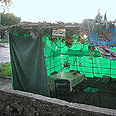

Sukkah
Photo: Gabi Menashe
We tend to stand in awe before palaces and skyscrapers. As opposed to these great Towers of Babel, the sukkah barely rises above the ground. The concrete and steel palaces will withstand storms. The sukkah will succumb to a breeze. And yet we are commanded to dwell in the sukkah.
Abraham Joshua Heschel wrote:
"We are all infatuated with the splendor of space, with the grandeur of things of space. Thing is a category that lies heavy on our minds, tyrannizing all our thoughts. Our imagination tends to mold all concepts in its image. In our daily lives we attend primarily to that which the senses are spelling out for us: to what the eyes perceive, to what the fingers touch.
"Reality to us is thinghood, consisting of substances that occupy space; even God is conceived by most of us as a thing. The result of our thinginess is our blindness to all reality that fails to identify itself as a thing.” (Abraham Joshua Heschel, The Sabbath, p. 5.)
Are we truly infatuated? Does the splendor of material palaces induce blindness? We are not blind, but we are colorblind. Devotion to the power of the pyramids subdues our sensitivity, and many of the hues of reality are cast in the shadow.
We are sure of ourselves. Sometimes, inflated self-assurance causes us harm by depriving us of the sensitivity to appreciate the depth of life’s little moments. We are proud of the skyscrapers we build.
Sitting in the sukkah – in a booth unsupported by heavy steel beams – defies the material enslavement that imprisons us. The fragile beauty of the sukkah has the power to teach us what is truly important.
In the Guide for the Perplexed, Maimonides explains that corporeality acts as a partition that separates us from God (Guide III:9). According to Maimonides’ philosophical approach, we advance spiritually as we succeed in freeing ourselves of from the material.
Substance is viewed as the great enemy of spirit in medieval Jewish thought. The sukkah holds the power to tame the beast. Sitting in the sukkah makes us aware of the temporary nature of the material world and of its beauty. The tamed substance of the sukkah is not the enemy of the spirit; it is a source from which the spirit powerfully flows forth.
Torah roundtable
“Young Israelite! Come to the sukkah even as a citizen of humanity… then all humanity will come to the sukkah, to the sukkah of universal peace. Then a bond of brotherhood will bind all humanity, and as brothers they shall come together to be protected under the rule of the Lord who is One.
"The sukkah will remove the bonds and suffering of Sheol from humanity, whose conduct supported it. Despite the mistaken and misleading concept of respecting material goods and property as if they were deities, humanity will renounce them, turn heavenward, and then God will bring it under its sukkah of peace, which will then be spread over all the peoples of the earth, and the one, unique God will then be for all humanity and his name will be One.” (Samson Raphael Hirsch, Horeb, Sukkah, 5)
- Can we say this about our sukkahs?
- How can the sukkah help us not to value property and material goods as deities?
- What does Hirsch mean when he says “humanity will renounce them”?
- Is such renunciation necessary in order for humanity to unite?
“The last of all the annual festivals is that which is called the feast of tabernacles, which is fixed for the season of the autumnal equinox. And by this festival the lawgiver teaches two lessons, both that it is necessary to honor equality and to hate injustice, because the first is the beginning and the source of justice, and the second is the beginning and the source of wrong. The first principle is like unshadowed light, while the second is like darkness...” (Philo, On the Special Laws, 204)
- Can these lessons be learned from our observance of the Sukkoth festival?
Courtesy of Schechter Rabbinical Seminary in the Schechter Institute of Jewish Studies















